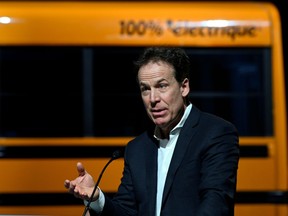St-Jérôme's Lion Electric bags record electric school-bus order
North America’s largest student transportation provider agreed to buy 260 all-electric Lion-built school buses for an undisclosed amount.

Article content
St-Jérôme’s Lion Electric Co. unveiled its biggest order Monday, sending its shares rocketing higher.
First Student Inc., North America’s largest student transportation provider, agreed to buy 260 all-electric Lion-built school buses for an undisclosed amount. The purchase agreement, the biggest by a single customer in Lion’s 13-year history, will make Cincinnati-based First Student the top operator of zero-emission school buses in Canada and the United States. First Student’s Transco unit will operate the buses in Quebec.
“This is a game-changer for us,” Marc Bédard, Lion’s founder and chief executive, said in a telephone interview. “It’s the first order of this magnitude in North America. They had bought buses from us before, so it’s a clear endorsement of our technology.”
Lion shares rose 9.4 per cent to $20 by the close of Toronto Stock Exchange trading. On the New York Stock Exchange, the stock gained 9.9 per cent to US$16.58.
Shares of the bus and truck maker began trading May 7 after Lion merged with Northern Genesis Acquisition Corp., a U.S.-based “blank-cheque” firm. The listing generated proceeds of about US$490 million, most of which will fund Lion’s future growth strategy.
Lion’s order book stands at 817 buses and trucks worth US$225 million. Most of the deliveries will probably take place in the next year, chief financial officer Nicolas Brunet said.
Demand for Lion’s purpose-built products is underpinned by a growing desire among school bus operators to electrify their fleets — along with targeted government subsidies aimed at accelerating the trend.
Quebec said in March it plans to spend $250 million over three years to buy electric school buses. By 2030, the goal is to have 65 per cent of the province’s school-bus fleet electrified.
U.S. President Joe Biden said recently he wants to electrify at least 20 per cent of the country’s fleet of yellow school buses, an investment of more than US$25 billion. States such as California and New York are also keen to step up electrification efforts.
“Many U.S. states are heading down that path,” Bédard said.
That’s precisely why Lion said 10 days ago it would invest at least US$70 million over three years to build an electric truck and bus facility in Joliet, Ill. The plant will be capable of making as many as 20,000 vehicles annually, which could result in about 750 people working at the site by 2024, Bédard said.
In March, Lion teamed up with the federal and Quebec governments to announce the construction of a $185-million battery pack assembly plant in St-Jérôme. The factory, which is scheduled to open in the second half of 2022, will eventually employ “hundreds of people,” Bédard said.
“Our goal for the entire company is to grow to a few thousand employees within a few years” from 650 currently, Bédard said. Employment at Lion’s existing St-Jérôme vehicle assembly plant will probably double to 1,000 by 2023, he said.
“We’ve been making vehicles for five years and battery packs for eight years, so it’s not as if these projects are completely new to us. The challenge will be to recruit people and to produce at a faster pace.”
Lion is developing eight additional vehicles — including a shuttle bus, a tractor truck and an electric ambulance — that will be ready in 2022. That led the company to invest a record US$16.5 million in research and development last year and another US$6.5 million in the first quarter of 2021.
Bédard estimates Lion has spent about US$200 million on R&D since he started the company in 2008.
Lion disclosed the First Student order Monday as it reported first-quarter results. The net loss widened to US$16.1 million, or 15 cents a share, from US$5.7 million, or five cents, a year ago, as Lion ramped up hiring. The company produced its first trucks during the period.






Postmedia is committed to maintaining a lively but civil forum for discussion. Please keep comments relevant and respectful. Comments may take up to an hour to appear on the site. You will receive an email if there is a reply to your comment, an update to a thread you follow or if a user you follow comments. Visit our Community Guidelines for more information.